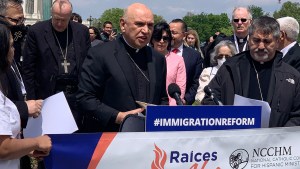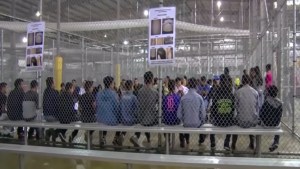The people of one New Jersey diocese might lose five of their priests over the next couple of years, because of stricter US immigration rules.
The priests – four from the Philippines and one from Colombia – joined the Diocese of Paterson, New Jersey, where they serve, in suing the federal government over new rules, saying the changes could lead to the exodus of “countless” foreign-born priests and religious.
The priests’ visas are due to expire in 2025 and 2026. The diocese says that a change enacted last year violates federal law and “directly threatens individual plaintiffs’ ongoing ability to carry out their religious and spiritual vocation.”
Creating a backlog
The Pillar explains that an April 2023 change to the Immigration and Nationality Act adds special categories of juvenile migrants to the same immigration category as those with religious worker visas — “essentially placing roughly 100,000 extra migrants in the category, while retaining the cap of 10,000 green cards to be issued per year for the category.”
That has created a large backlog in permanent residency applications by priests and religious serving in US dioceses who entered the country on religious worker visas (R-1). The Paterson Diocese’s lawsuit says the change will force religious workers to “either violate the terms of their nonimmigrant visa or face imminent and abrupt departure” from the US.
As The Pillar explains:
Before the policy change, those priests could enter the country on an R-1 visa, begin ministry, and apply for permanent resident status with the reasonable expectation that they would have their green card usually within 18 months — before their five-year R-1 visa expired.
Since the policy change and the resulting backlog, priests looking to convert their R-1 visas into a green card can expect to wait years — meaning they have to leave the country when their temporary visa expires and wait a year before they can return under a new R-1.
The issue is set to cause acute problems for many U.S. dioceses in the near future, as many of them rely on foreign-born priests to serve in parishes and other diocesan ministries.
15-year wait
The problem has been on the radar screen of the Church in the US for some time. In June, at their semi-annual gathering, the US Conference of Catholic Bishops heard from Bishop Mark Seitz of El Paso, Texas, who said, “A priest applying for a green card today will be forced to wait an estimated 15 years before a resident visa becomes available to him.”
The US Department of State issued a statement in response to the Paterson Diocese lawsuit, saying it acknowledged that a change enacted last year did indeed lead to “significantly longer worldwide waits” for EB-4 visas. State says it recognizes the importance of religious ministers and workers as well as their U.S. employers who lead faith-based institutions.
“We share your concern about the long wait times for EB-4 visas,” the statement said.
But the department told northjersey.com that “only Congress has the ability to address the imbalance between the limited supply of EB-4 visas and the increasing demand.”
Bishop Seitz recognizes that himself.
“Ultimately, only Congress can provide a solution that addresses the underlying visa backlog,” he told his fellow bishops in June.




